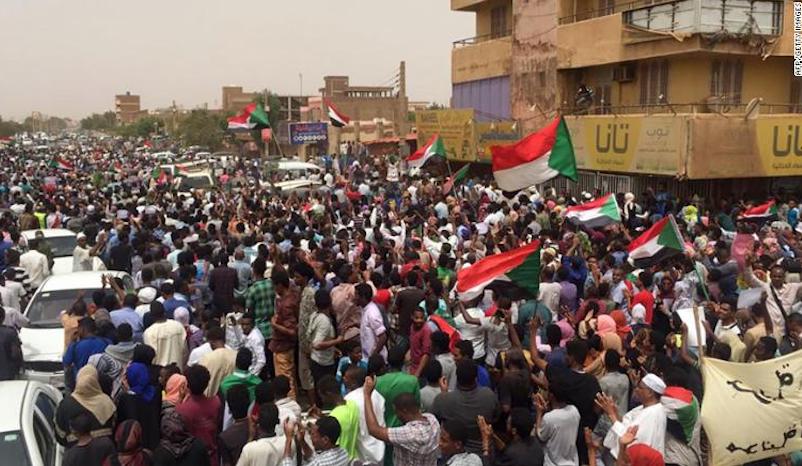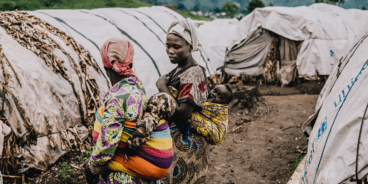

Atrocity Alert is a weekly publication by the Global Centre for the Responsibility to Protect highlighting situations where populations are at risk of, or are enduring, mass atrocity crimes.
Mass protests and civilian deaths continue in Sudan
Last Sunday, 30 June, tens of thousands of protesters took to the streets across Sudan in mass demonstrations against the Transitional Military Council’s (TMC) refusal to hand over power to a civilian-led council. Protesters also demanded justice for the security forces’ use of lethal force during previous demonstrations. When protesters approached the Presidential Palace in Khartoum, security forces used tear gas and according to the TMC, “unknown snipers” shot at both civilians and soldiers. During the nation-wide day of protest at least 11 people were killed and more than 181 injured.
Since 19 December ongoing mass demonstrations have taken place in Sudan against military rule and economic stagnation. On 11 April President Omar al-Bashir was overthrown and the TMC was installed. On 3 June ongoing political tensions between the TMC and civilian protesters escalated following the violent dispersal of a permanent sit-in protest outside the Army’s Headquarters in Khartoum. During the crackdown more than 100 people were killed by the paramilitary Rapid Support Forces acting under the command of the deputy head of the TMC, General Mohamed Hamdan Dagalo, who is also known as Hemedti.
The African Union has refused to recognize the TMC as the legitimate government of Sudan and on 27 June it offered a transition plan to the TMC and representatives of the protesters, the Forces for Declaration of Freedom and Change (FFC). The proposal suggests a sovereign council consisting of 7 civilians, 7 members of the military, and one independent member. The proposed council would govern Sudan until elections in three years’ time. The European Union has said that “a civilian-led transitional authority is the only partner with which EU-Sudan relations can be normalized.”
All states should freeze diplomatic relationships until the TMC and the FFC agree on a transitional arrangement. The TMC must immediately end the use of disproportionate and deadly force against peaceful protesters and uphold the universal right to freedom of assembly, association and expression. The Human Rights Council, during its current 41st session, should adopt a resolution calling for the establishment of an investigative mechanism to identify alleged perpetrators of human rights violations and abuses in Sudan since 19 December. Those with command authority who are responsible for the killing of peaceful unarmed protesters need to be held accountable.
Ongoing armed conflict threatens the human rights of all Cameroonians
Civilians in the north-west and south-west regions of Cameroon face potential atrocity crimes as deadly conflict continues between the government and armed separatists calling for the independence of the Anglophone regions. Since October 2017 at least 650 civilians, 235 members of the security forces, and an estimated 1,000 alleged separatists have been killed as a result of ongoing fighting. More than 530,000 people have been displaced and more than 170 Anglophone villages have been burned or destroyed by government forces.
As the crisis continues, there has been growing evidence of armed separatists attacking and destroying civilian infrastructure. Hospitals have been burned down, with reports of medical personnel threatened and sometimes killed for allegedly treating government soldiers. The education of approximately 600,000 children has been affected by attacks on schools, with an estimated 80 percent of schools in the Anglophone region forced to close and teachers abused following accusations of collaboration with the Francophone-dominated government. Some armed separatists have also attacked humanitarian convoys delivering aid to vulnerable populations, declaring the aid to be “poisoned” since the convoys are escorted by the army.
After her visit to Cameroon last May, the UN High Commissioner for Human Rights, Michelle Bachelet, stressed that the situation in the country “risks spiraling completely out of control, if serious measures are not taken to reduce tensions and restore trust.” However, the government continues to rely on extrajudicial killings, arbitrary detention and saturating the Anglophone regions with security forces rather than addressing the underlying causes of the conflict.
The government and armed separatists must end all extrajudicial killings and ensure that the human rights of all Cameroonians are equally protected, regardless of language, cultural identity or political affiliation. Armed separatist groups must immediately stop attacking schools, hospitals and humanitarian convoys. Both the separatists and the government should fully cooperate with the mediation process proposed by the Swiss government and work towards a negotiated political solution to the crisis in the north-west and south-west regions. The UN Security Council should also formally add Cameroon to its agenda and consider targeted sanctions against all those violating the human rights of the Cameroonian people.
UN Security Council visits Iraq as justice for ISIL atrocities remains elusive
On Saturday, 29 June, the UN Security Council held meetings in Baghdad as part of a visiting mission to Kuwait and Iraq. The visit coincided with the fifth anniversary of the so-called Islamic State of Iraq and the Levant (ISIL) declaring a caliphate in Syria and Iraq. Although the armed extremist group has not held any territory in Iraq since November 2017, many UN and Iraqi officials emphasized that ISIL continues to pose a threat to civilians throughout the region.
During the visit the Security Council also met with Special Adviser Karim Kahn, head of the UN Investigative Team to Promote Accountability for Crimes Committed by Da’esh/ISIL (UNITAD). The Council expressed their continued support for efforts to “hold ISIL accountable by collecting, preserving, and storing evidence of acts that may amount to war crimes, crimes against humanity and genocide.”
Despite UNITAD gathering evidence over the past year, including the exhumation of mass graves in Sinjar, no ISIL member has ever been held legally accountable for mass atrocity crimes perpetrated against Yazidis, Christians and other minority populations in Iraq. Between June 2014 and November 2017 ISIL committed widespread and systematic violations of international human rights and humanitarian law. The group has also recently been implicated in the deliberate burning of vital crops and farmland in Iraq and Syria.
Ahead of the fifth anniversary of the genocide of the Yazidi on 3 August, the UN Security Council and the entire international community must increase efforts to hold ISIL perpetrators legally accountable. Although the Iraqi government has conducted trials of thousands of ISIL members, including foreign fighters captured in Iraq, the courts have relied exclusively on counter-terrorism laws. In many cases, death sentences have been imposed after perfunctory trials that fail to meet international standards of due process.
Many survivors of ISIL’s atrocities, including 2018 Nobel Peace Prize laureate Nadia Murad, continue to insist that bringing ISIL fighters “to justice in the framework of an international tribunal that tries them for crimes of genocide and sexual violence against women, would send messages to others and prevent such crimes in the future.” Iraq’s government should work with UNITAD and survivors’ organizations to establish a credible and transparent legal process to punish ISIL members who are responsible for mass atrocity crimes.
Related Publications


